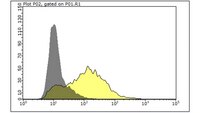MABS1954-100UG Sigma-AldrichAnti-DARC (CD234) Antibody, clone NaM185-2C3
Anti-DARC (CD234), clone NaM185-2C3, Cat. No. MABS1954, is a mouse monoclonal antibody that detects DARC (Duffy antigen/chemokine receptor) and is tested for use in ELISA, Flow Cytometry, Inhibition Assay, Radioimmunoassay, and Western Blotting.
More>> Anti-DARC (CD234), clone NaM185-2C3, Cat. No. MABS1954, is a mouse monoclonal antibody that detects DARC (Duffy antigen/chemokine receptor) and is tested for use in ELISA, Flow Cytometry, Inhibition Assay, Radioimmunoassay, and Western Blotting. Less<<Prodotti consigliati
Panoramica
| Replacement Information |
|---|
| References |
|---|
| Product Information | |
|---|---|
| Format | Purified |
| Presentation | Purified mouse monoclonal antibody IgG1 in PBS without azide. |
| Quality Level | MQ200 |
| Physicochemical Information |
|---|
| Dimensions |
|---|
| Materials Information |
|---|
| Toxicological Information |
|---|
| Safety Information according to GHS |
|---|
| Safety Information |
|---|
| Packaging Information | |
|---|---|
| Material Size | 100 μg |
| Transport Information |
|---|
| Supplemental Information |
|---|
| Specifications |
|---|
| Global Trade Item Number | |
|---|---|
| Numero di catalogo | GTIN |
| MABS1954-100UG | 04065266020625 |
Documentation
Anti-DARC (CD234) Antibody, clone NaM185-2C3 MSDS
| Titolo |
|---|
Anti-DARC (CD234) Antibody, clone NaM185-2C3 Certificati d'Analisi
| Titolo | Numero di lotto |
|---|---|
| Anti-DARC (CD234), clone NaM185-2C3 - Q3666273 | Q3666273 |







